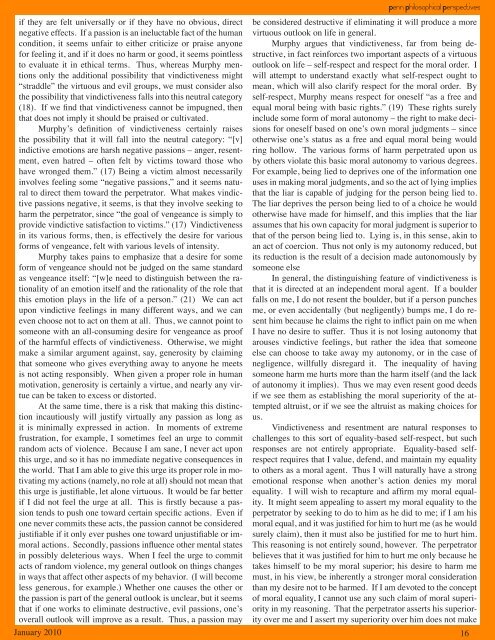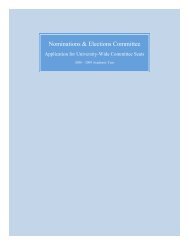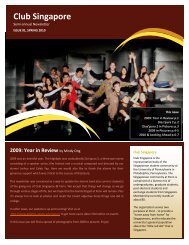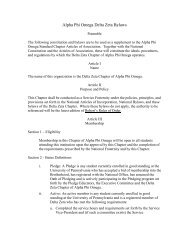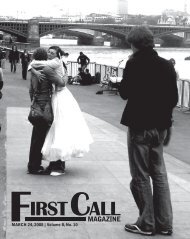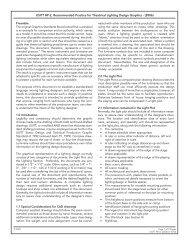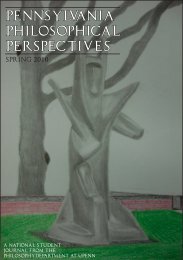Penn Philosophical Perspectives - University of Pennsylvania
Penn Philosophical Perspectives - University of Pennsylvania
Penn Philosophical Perspectives - University of Pennsylvania
- No tags were found...
You also want an ePaper? Increase the reach of your titles
YUMPU automatically turns print PDFs into web optimized ePapers that Google loves.
if they are felt universally or if they have no obvious, directnegative effects. If a passion is an ineluctable fact <strong>of</strong> the humanfor feeling it, and if it does no harm or good, it seems pointless tionsonly the additional possibility that vindictiveness might“straddle” the virtuous and evil groups, we must consider alsothe possibility that vindictiveness falls into this neutral categorythat does not imply it should be praised or cultivated. - involves feeling some “negative passions,” and it seems natu-tivepassions negative, it seems, is that they involve seeking toharm the perpetrator, since “the goal <strong>of</strong> vengeance is simply toin its various forms, then, is effectively the desire for variousforms <strong>of</strong> vengeance, felt with various levels <strong>of</strong> intensity. form <strong>of</strong> vengeance should not be judged on the same standardtionality<strong>of</strong> an emotion itself and the rationality <strong>of</strong> the role thatupon vindictive feelings in many different ways, and we caneven choose not to act on them at all. Thus, we cannot point tosomeone with an all-consuming desire for vengeance as pro<strong>of</strong>make a similar argument against, say, generosity by claimingthat someone who gives everything away to anyone he meetsmotivation, generosity is certainly a virtue, and nearly any virtuecan be taken to excess or distorted. tionincautiously will justify virtually any passion as long asit is minimally expressed in action. In moments <strong>of</strong> extremefrustration, for example, I sometimes feel an urge to committhis urge, and so it has no immediate negative consequences inthe world. That I am able to give this urge its proper role in motivatingmy actions (namely, no role at all) should not mean that-one never commits these acts, the passion cannot be considered-acts <strong>of</strong> random violence, my general outlook on things changesin ways that affect other aspects <strong>of</strong> my behavior. (I will becomethe passion is part <strong>of</strong> the general outlook is unclear, but it seemsthat if one works to eliminate destructive, evil passions, one’soverall outlook will improve as a result. Thus, a passion mayJanuary 2010<strong>Penn</strong> <strong>Philosophical</strong> <strong>Perspectives</strong>be considered destructive if eliminating it will produce a morevirtuous outlook on life in general. structive,in fact reinforces two important aspects <strong>of</strong> a virtuouswill attempt to understand exactly what self-respect ought toequal moral being with basic rights.” (19) These rights surely-otherwise one’s status as a free and equal moral being wouldring hollow. The various forms <strong>of</strong> harm perpetrated upon usby others violate this basic moral autonomy to various degrees.For example, being lied to deprives one <strong>of</strong> the information oneuses in making moral judgments, and so the act <strong>of</strong> lying impliesthat the liar is capable <strong>of</strong> judging for the person being lied to.The liar deprives the person being lied to <strong>of</strong> a choice he wouldotherwise have made for himself, and this implies that the liarassumes that his own capacity for moral judgment is superior tothat <strong>of</strong> the person being lied to. Lying is, in this sense, akin toan act <strong>of</strong> coercion. Thus not only is my autonomy reduced, butits reduction is the result <strong>of</strong> a decision made autonomously bysomeone elseIn general, the distinguishing feature <strong>of</strong> vindictiveness isthat it is directed at an independent moral agent. If a boulderfalls on me, I do not resent the boulder, but if a person punchesme, or even accidentally (but negligently) bumps me, I do re-I have no desire to suffer. Thus it is not losing autonomy thatarouses vindictive feelings, but rather the idea that someoneelse can choose to take away my autonomy, or in the case <strong>of</strong>negligence, willfully disregard it. The inequality <strong>of</strong> havingsomeone harm me hurts more than the harm itself (and the lack<strong>of</strong> autonomy it implies). Thus we may even resent good deedsif we see them as establishing the moral superiority <strong>of</strong> the attemptedaltruist, or if we see the altruist as making choices forus. challenges to this sort <strong>of</strong> equality-based self-respect, but such respect requires that I value, defend, and maintain my equalityto others as a moral agent. Thus I will naturally have a strongemotional response when another’s action denies my morality.It might seem appealing to assert my moral equality to theperpetrator by seeking to do to him as he did to me; if I am hisThis reasoning is not entirely sound, however. The perpetratortakes himself to be my moral superior; his desire to harm memust, in his view, be inherently a stronger moral considerationthan my desire not to be harmed. If I am devoted to the concept<strong>of</strong> moral equality, I cannot use any such claim <strong>of</strong> moral superiorityin my reasoning. That the perpetrator asserts his superiorityover me and I assert my superiority over him does not make16


